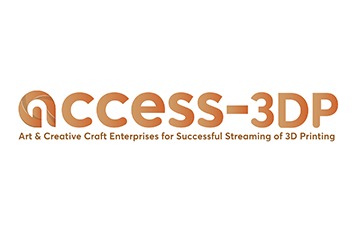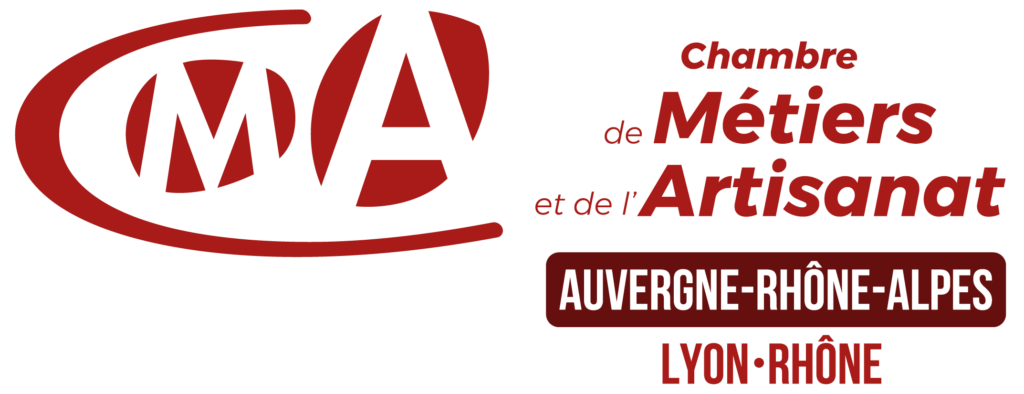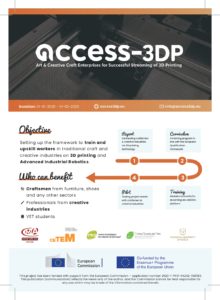
The exploitation of advanced manufacturing technologies, such as additive manufacturing (also called 3D printing), requires high technical skills, but also transversal capacities such as creativity, innovation and entrepreneurial approach.
Craft businesses have the creative and innovative capacities to adopt these technologies.
Nevertheless, to allow craftsmen to adopt and fully exploit the potential of 3D printing, it is necessary not only to invest in physical capital (machines), but also to train human capital, through training programs that are specifically dedicated to small businesses and adapted to the needs of the market for this audience.
ACCESS-3DP is a collaborative project aiming to strengthen the competitiveness of craft businesses through the use of 3D printing.
Objectives
To allow craft companies to exploit the potential of 3D printing and more specifically:
- To make training sessions on 3D printing more effective and efficient, by matching the needs of craft businesses.
- To optimize training systems by highlighting the added value of 3DP for craft companies and by developing a MOOC.
- To structure a partnership between schools and companies for the optimization of resources and a better employability.
Targeted audiences
Craft companies interested in 3D printing, technology professionals, designers, 3D printing manufacturers and project leaders interested in starting a business using 3D printing.
Main activities
- Development of a comparative study of 3DP training programs in Europe and identification of training needs for craft companies wishing to adopt this technology.
- Design of a training course / curriculum on 3D printing techniques specially designed for craft companies.
- Development and integration of learning modules on 3D printing and, its practical application for craft companies, on a MOOC (Massive Open On-line Course) platform.
- Test and validation of innovative tools with craft companies.
Starting dates
October 2020 (30 months)
Project coordinator
Partners
This project is co-funded with the support of the European ERASMUS + program
Last updates
Results
» Executive summary to identify the skills mismatched between the craft and traditional industries in relation to AM technologies.
» Study report on how VET providers can innovate and interconnect traditional and creative craft industries through 3DP.
→ Structure of ACCESS-3DP training course
→ ACCESS-3DP Joint Curriculum report
describing the full curriculum and the validation process in details, with an overview of the national education framework in France, Spain, Portugal, Slovakia and Slovenia.
The document is destinated to traners wishing to use the ACCESS 3DP course in their courses. It clarifies the goals and aims of the training material, and it illustrates the training paths training modules.
→ Open Education Resources (OER) strategy report
Because of the growing importance of OER in today’s education, ACCESS-3DP has developed the following report to summarise OER content and to analyse different license conditions. It explains how an agreement on the licensing works and how ACCESS-3DP Consortium ensures the property rights on its material, respecting at the same time the Erasmus+ Programme rules.
→ E-learning platform ACCESS-3DP
including 6 training modules and educational content designed for craft companies and enriched with examples to better understand and exploit 3D printing technology:
- Module 1 – Innovation process applied in traditional sectors
- Module 2 – Design Thinking & Skills
- Module 3 – 3D Printing & Production Process
- Module 4 – Current processes- Different fields of application
- Module 5 – Entrepreneurship and 3D Printing – New Business Ideas
- Module 6 – Advanced Industrial Robotics applied in crafts
The platform is available in several languages and accessible by creating an account.
providing a plan for the pilot phase
describing the pilot phase et results achieved
Get more information about ACCESS-3DP and subscribe to our newsletter
The European Commission’s support for the production of this publication does not constitute an endorsement of the contents, which reflect the views only of the authors, and the Commission cannot be held responsible for any use which may be made of the information contained therein.



